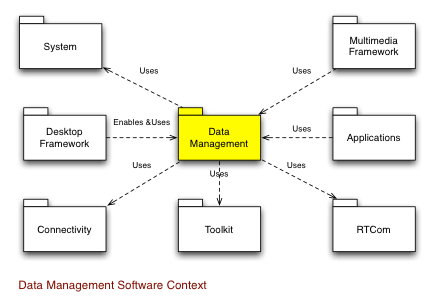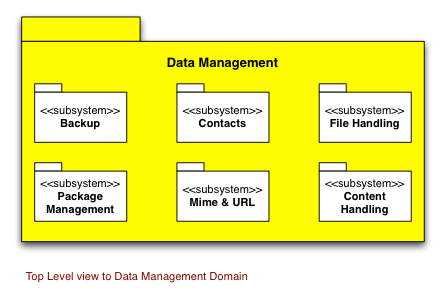Documentation/Maemo 5 Developer Guide/Architecture/Data Management
m (→Content Handling (Tracker): D-Bus) |
(→Software context: add links) |
||
| (One intermediate revision not shown) | |||
| Line 2: | Line 2: | ||
Data management subsystem has the following relationships. | Data management subsystem has the following relationships. | ||
| - | *Toolkit: This domain provides the set of lowlevel libraries like widgets that are used by the Data Management components. The Data Management provides for this layer the virtual file system and input methods. | + | * Toolkit: This domain provides the set of lowlevel libraries like widgets that are used by the Data Management components. The Data Management provides for this layer the virtual file system and input methods. |
| - | * | + | * [[Documentation/Maemo 5 Developer Guide/Architecture/RTCOM|RTCOM]]: Depends on the addressbook functionality provided by the Data Management |
| - | Applications: Generally applications depend on the file- and | + | * Applications: Generally applications depend on the file- and MIME-handling provided by the data management domain. |
| - | *Connectivity: The virtual file system in data management is depending on the libraries provided by the connectivity. They are used when hiding the connecting to Bluetooth and network folders. | + | * [[Documentation/Maemo 5 Developer Guide/Architecture/Connectivity|Connectivity]]: The virtual file system in data management is depending on the libraries provided by the connectivity. They are used when hiding the connecting to Bluetooth and network folders. |
| - | *System: Data management uses the system hardware information provided by the system domain. | + | * [[Documentation/Maemo 5 Developer Guide/Architecture/System Software|System]]: Data management uses the system hardware information provided by the system domain. |
| - | *Multimedia Framework: Uses Data Management to access the file on different drivers and devices. | + | * [[Documentation/Maemo 5 Developer Guide/Architecture/Multimedia Domain|Multimedia Framework]]: Uses Data Management to access the file on different drivers and devices. |
| - | [[Image:Data_Management_sw_context.png]] | + | [[Image:Data_Management_sw_context.png|frame|center|alt=ULM diagram of data management|Data management software context]] |
==System Decomposition View== | ==System Decomposition View== | ||
| - | [[Image:Data_Management_decomposition.png]] | + | [[Image:Data_Management_decomposition.png|frame|center|alt=Diagram of data management domain|Data management domain]] |
===Contacts (Addressbook)=== | ===Contacts (Addressbook)=== | ||
Latest revision as of 12:51, 7 September 2010
Contents |
[edit] Software context
Data management subsystem has the following relationships.
- Toolkit: This domain provides the set of lowlevel libraries like widgets that are used by the Data Management components. The Data Management provides for this layer the virtual file system and input methods.
- RTCOM: Depends on the addressbook functionality provided by the Data Management
- Applications: Generally applications depend on the file- and MIME-handling provided by the data management domain.
- Connectivity: The virtual file system in data management is depending on the libraries provided by the connectivity. They are used when hiding the connecting to Bluetooth and network folders.
- System: Data management uses the system hardware information provided by the system domain.
- Multimedia Framework: Uses Data Management to access the file on different drivers and devices.
[edit] System Decomposition View
[edit] Contacts (Addressbook)
- Purpose
- Provides a general framework to store the contact and presence information. It is used especially by the RTCOM domain for handling their contact and presence information.
- Responsibilities
-
- Store contact information
- Store presence information
- Provide information about contact’s capabilities
- License
- Nokia/LGPL/GPL
[edit] Package management
- Description
- Provides a way of managing the installed packages on the device. This also includes installing new versions of the components, for example when updating the device,
- Responsibilities
-
- Manage component and application installation
- Manage component updates
- License
- GPL
[edit] Backup
- Purpose
- Provides a general framework to backup and restore user’s data.
- Responsibilities
-
- Restore data
- Backup user’s data
- License
- Nokia
[edit] File Management
- Purpose
- Provides whole stack for file management. This includes file access, virtual file system, mime handling and URI schema handling. The domain also provides the UI that is needed for the file access.
- Responsibilities
-
- Virtual file system (gnome-vfs)
- Mime handling (libhildonmime)
- Widgets for file handling (hildon-fm)
- File manager
- License
- Nokia/LGPL
[edit] Content Handling (Tracker)
- Purpose
- Provide a one stop solution for all metadata, tags, shared object databases, search tools and indexing.
- Responsibilities
-
- Provides an Indexer, a lightweight daemon that extracts information from files (trackerd)
- Tracker Search Tool, a small GUI to search for indexed data
- Command line tools for searching, querying the daemon status, and tagging
- libtracker, a C wrapper around the D-Bus API.
- License
- GPL/LGPL
- This page was last modified on 7 September 2010, at 12:51.
- This page has been accessed 25,048 times.


